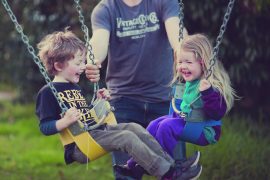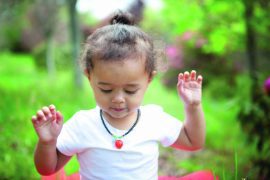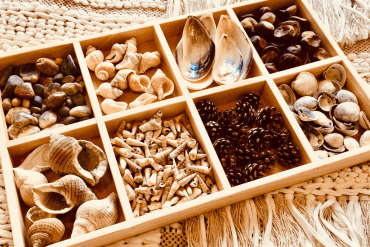She intentionally (or so it appears) pours a glass of milk on to the table, where it cascades on to the floor. Having her help clean it up is a logical consequence. You get her a rag, and you ask (or preferably, tell) her to clean up the milk she spilled. She refuses. Or laughs. Or runs off. You go get her and you calmly explain that the milk is on the floor and it has to get cleaned up because if it stays there it will start to smell really bad and it will make the floor slippery and dangerous, and that you’d like her to help clean it up, and that you will help her. You get two cloths, and offer her one, and you ask (tell) her “I need your help to clean up the milk. Here is your cloth and here is my cloth. We’ll do it together.” Or you get one cloth and a small container of water, and you say “We need to clean up the milk. Would you like to use the cloth to wipe it up or would you like to hold the container while I wipe it up?” (Pay attention: here’s where it gets tricky. Don’t stop reading now!) She refuses again. Or laughs again. Or throws the rag. Or runs off again. You’re sitting there (undoubtedly frustrated) thinking “But I asked just the right way! I gave her choices! I offered to help her! She can’t just pour milk on the floor and not have any consequence! I have to wait her out or make her come do it – how do I do that? I’m perfectly calm, I’m not getting upset, I’m doing everything the way the books/experts say to do, and she’s still not helping! I have the most out of control kid ever. What now?!?
I’ll tell you “what now”. Model graciousness. Clean it up. Say, with confidence (and feel with confidence, too… that matters) that you’re happy to help this time and that you’re sure she will help next time. Because you are sure that she’ll help next time (right??). And if it turns out that you’re wrong, and she doesn’t help next time, still have confidence that she will do it the next time (and chalk it up to developmental stage or fatigue or teething or a long day at school or that toy that broke earlier in the day). Quiet the anxious voices in your head that say “If i clean it up, she’ll never learn responsibility.” Quiet the resentful voices in your head that say “I’m sick of doing everything for her when she’s perfectly capable of doing it herself.” Quiet the punitive voices in your head that say “She spilled it, she needs to clean it up.” Have trust that she will do it next time. Because one of these times, she will. She will be like you. Helpful. Generous. Altruistic.
I would give another example, but it works pretty much the same way no matter what the example is. You know that expression “Be the change you wish to see in the world?” Yeah. This is that, parenting style.
You want to know why. I know you want to know why. So I’m going to put it as simply as I possibly can: “I didn’t do it.”
I know that all of us have heard this, whether as a child ourselves, as a teacher, as a parent, among extended family, or at the park. A parent or a teacher or an older child asks (tells?) children to clean something up. They say “I didn’t do it” or “It’s not my mess” or “You clean it up” or “I wasn’t working over there.”
I don’t know about you, but for me, this phrase is like fingernails on a chalkboard. It is the epitome of everything that I do not want my child to be. I want to raise a child who is prosocial, generous, altruistic, empathic. I want my child to be the one the teacher sends an email about because she was the only one who didn’t laugh when another child’s experiment blew up in science class, and the only one who went over and helped him clean it up without being asked. I never want to hear the words “It’s not my mess” come out of my child’s mouth when she is asked to help clean up – by me or anyone else. I want her to smile and say “Sure.” And I don’t only want her to help – I want her to help without resentment of any sort. (Is it a pipe dream? No. It isn’t.) This is what altruism is. I hold it sacred.
If I want her to do that and be that person, then I have to do that and be that person. Help without resentment. Accept others’ emotional or developmental limitations, either in general or in the moment. Model graciousness.
Trust. It’s the elusive trick of parenting. We resort to control and fear because we do not trust that who we are is enough, that the values and traits that we model will be enough to transmit what we wish for our children to embody. We don’t trust that we do all of it as well as we want our children to do it – we want them to be better than us, not just like us. So we have to teach them to do it better than we do. And we forget that that’s not possible, because they are watching us.
Trust. It’s the elusive trick of parenting. We resort to control and fear because we do not trust that who we are is enough, that the values and traits that we model will be enough to transmit what we wish for our children to embody.
So this is the hard stuff. Trusting that we’re enough. Trusting that yes, we’ll make mistakes, and we’ll acknowledge them and try to do better, and they’ll see that and forgive their own mistakes. Trusting that we can make the changes in ourselves that we want for our children. Trusting that we don’t have to be perfect to transmit the values that we hold most dear. Trusting that if we embody the values that we desire, our children will develop them, in their own way and time, which may be different than the way and time that we imagine. It’s a tall order. It’s worth it.
And yes. There are things that are non-negotiable. And yes, those require a different set of strategies. This isn’t the answer for every single potential power struggle. There is no “answer” for every situation in parenting. Everything “depends”. There are times that this doesn’t apply. And then you pull a different tool out of your tool box. Sometimes playfulness really helps. Sometimes sticking firmly to a strict limit is the only viable choice. But a lot of the time, modeling graciousness is just the thing.
Just to be clear: this is not about just following your child around, cleaning up after them. That would be a failure to teach them responsibility, and yes, that teaches entitlement. This is about seeing yourself as a willing helper, the extra support that our children need to practice or to be willing to do it themselves. Modeling graciousness does not mean you don’t have expectations. You do. You must. It’s about what happens when those expectations fall apart, and having another tool in your toolbox, one that is not motivated by fear or control.
Just for today, try it out. Do an experiment. Take that phrase, that anxiety-laden phrase (or any facsimile thereof), “I have to make them do it or they’ll never learn”, take it out of your head for the day. Replace it with “I will model the behavior and values that I desire. I trust that they will learn from me.” Every time you hear one of those phrases come into your head (“But he has to!” “She’s gonna be a spoiled brat” “I’m failing at this whole parenting thing, I’m a pushover” “No one else has kids that are rude like mine”), push it out. Reject it. Replace it with “We are in this together. I trust in their generosity and capabilities. It will come.”
Yeah, it requires a leap of faith, like a high jump off the rocks into a crystal blue ocean. Scary. Yes. Never thought we’d find ourselves there. But instead of spending two hours standing there explaining to our children why they need to jump, why they shouldn’t be afraid, how you will catch them, why it’s important to overcome their fear, how you-came-up-all-this-way-because-they-said-they-wanted-to-do-it-and-you’re-not-going-back-down-so-they-might-as-well-jump-because-that’s-what-has-to-happen, you are jumping with your child, hand in hand, both of you laughing and screaming with glee (and some fear) as you fall through the air, splash, and surface with unbridled victory and accomplishment beaming from both of your faces. It will be an source of pride for both of you for years to come. Your child will see you as fearless. You will see them as courageous. And well into the future, you will both remember. You will remember that, in this life, we’re all in it together. Start now.
Originally published HERE.
Robin is Founder and President of Visible Child, a child development consultation and parent coaching firm in the U.S. that focuses on a unique model of respect-based parenting grounded in evidence-based child development research. She speaks and conducts workshops and does individual consultation with parents worldwide, authors the Visible Child blog, and runs the Visible Child parenting groups on Facebook. She can be reached at robin@visiblechild.com.










